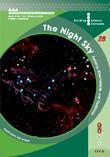You are here:
- Home »
- Teaching resources »
- Building Science Concepts »
- Titles and concept overviews »
- The Night Sky: Patterns, Observations, and Traditions

Book 28: The Night Sky: Patterns, Observations, and Traditions
Synopsis
Most children, from an early age, are aware of luminous objects in the night sky. However, because of this early awareness, they may have a simplified understanding of stars that can lead to strongly held misconceptions. This book seeks to help you to address some of those misconceptions and to develop children's understanding through activities that are relevant to their experiences.
Note:
This set of books is accompanied by a picture pack and 4 posters linking to the astronomy themed books in the Building Science Concepts series:
The Moon
(Book 8);
Our Star, the Sun
(Book 20);
Exploring Space
(Book 27) and The Night Sky (Book 28).
The picture pack contains 16 space-themed cards.
The posters are: The Solar System, Phases of the Moon, The Southern Night Sky (Spring) and The Southern Night Sky (Autumn).
Concept overview
Use the concept overview, which is also on the inside front cover of the book, as a reference for the concepts that relate to The Night Sky: Patterns, Observations, and Traditions.
![]() Read the concept overview
(PDF 39 KB)
Read the concept overview
(PDF 39 KB)
Links with other titles in the series
Children should complete the activities in The Moon, Book 8, and Our Star, the Sun, Book 20, before starting on The Night Sky. It is important that the concepts in these books are firmly in place before tackling this book.
The topic also links to the Nature of Science strand of the science curriculum. Several activities give children the opportunity to develop their understanding of scientific phenomena and ideas and compare cultural ways of seeing and interpreting them.
- Book 8: The Moon (L3-4, Planet Earth and Beyond)
- Book 20: Our Star, the Sun (L1-2, Planet Earth and Beyond)
- Book 27: Exploring Space (L3-4, Planet Earth and Beyond)
Assessment resources
Search the science section of the Assessment Resource Banks (ARB) website to find resources that assess the 'big idea' learning outcomes referred to in the concept overview for this title.

